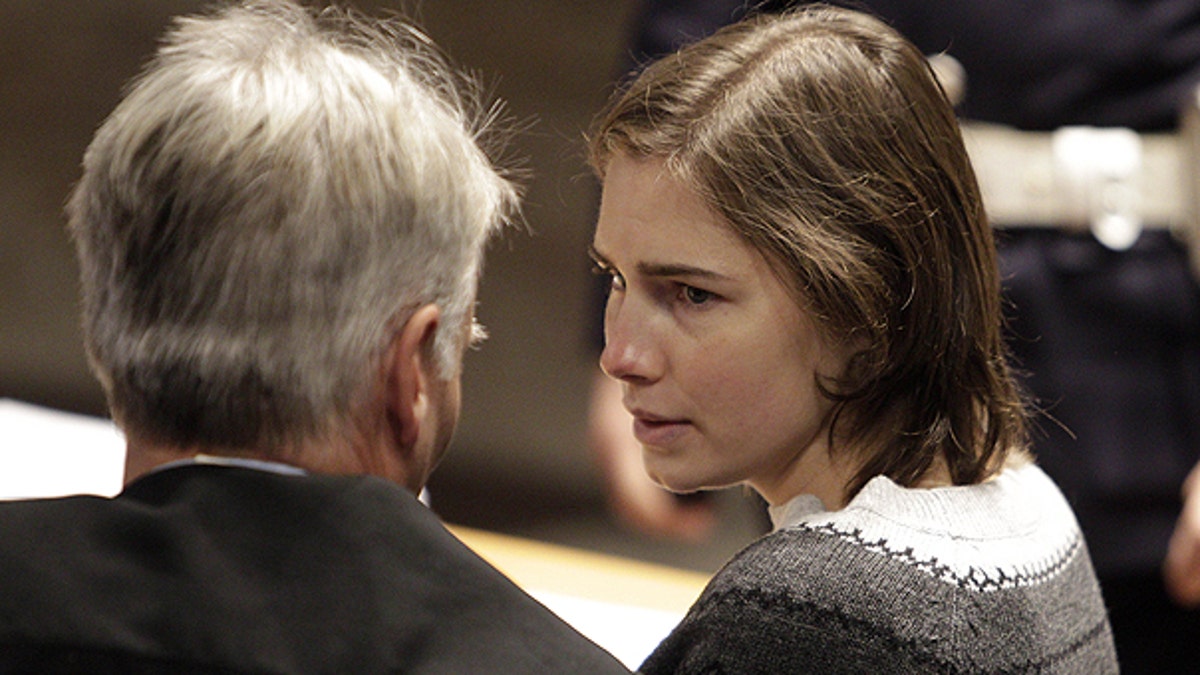
Dec. 11: Amanda Knox, right, talks to one of her lawyers during a hearing in her appeals trial, at Perugia's courthouse, Italy. (AP)
PERUGIA, Italy – Amanda Knox won an important victory in her appeals trial of her murder conviction in Italy on Saturday, when a court ruled that it will allow an independent review of crucial DNA evidence after defense claims that samples were inconclusive and possibly contaminated.
The lower court trial, which convicted the American student a year ago and sentenced her to 26 years in Italian prison, had rejected a similar defense request for an outside review of DNA found on the bra clasp of the victim, her British roommate Meredith Kercher, and on a knife the prosecution alleged was used in the fatal stabbing attack.
Kercher's body was found in a pool of blood on Nov. 2, 2007, her throat slit in the apartment she shared with Knox. Forensic experts said she was killed the night before.
Knox burst into tears, in a sign of a release of tension, said her stepfather Chris Mellas. "She's a happy mess," he said, smiling.
She was convicted of sexually assaulting and murdering Kercher in the rented house they shared in the university town of Perugia, where both were studying. The co-defendant in the appeals trial is her ex-boyfriend, Raffaele Sollecito, an Italian who was convicted of the same charges and sentenced to 25 years. Both deny any wrongdoing.
Prosecutors maintain that Sollecito's DNA was found on the bra clasp and that Knox's DNA was found on the knife's handle and Kercher's DNA on the blade. The defense maintains that DNA traces presented at the first trial were inconclusive and also contends they might have been contaminated when they were analyzed.
The court handed the defense another victory. It will allow several witnesses the defense hopes will refute testimony that placed Knox and Sollecito near the house on the night Kercher was killed.
Knox's mother, Edda Mellas, burst into tears of joy in the courtroom when the appeals court announced its decision. "Finally a little bit of good news," Mellas said, as Knox's family members hugged defense team lawyers.
Judge Claudio Pratillo Hellman said after 90 minutes of deliberations that the DNA evidence review was needed "to remove any reasonable doubt."
He said two independent experts, from Rome's Sapienza university, would either make new analyses of the DNA traces found, or if that isn't possible, would review the analyses that had been carried out by previous forensic experts and assess whether they are reliable.
DNA evidence was crucial in the first trial, where a clear motive did not emerge for the brutal killing.
"Finally, the trial can begin," said Luca Maori, an attorney for Sollecito. "After three years, we have scored our first important victory."
A Knox defense attorney, Luciano Ghirga, called the ruling Saturday "a significant step" and "a victory not for one side, but for the truth."
The experts will be formally assigned the task of the review at the trial's next session, on Jan. 15.
The court said it might decide at a later stage to allow other witnesses sought by the defense.
The court rejected several of the defense requests, including for new tests on Sollecito's computer related to the young man's alibi for the night of the slaying.
Francesco Maresca, a lawyer for the Kercher family who had opposed the review, said that "if the court has any remaining doubts, it does well to try to remove them."
"And now we'll see what these experts will conclude," he told reporters at the end of the hearing.
The review will take at least 30 days, and with new witnesses being heard, the trial is expected to go until next spring.
In seeking the new witnesses, the defense is seeking to refute testimony in the first trial from Antonio Curatolo, a homeless man who said he had seen Knox and Sollecito chatting on a basketball court near the apartment house the night Kercher was killed.
The defense insists his testimony was unreliable and hopes the new witnesses, who operate buses and discos in the area, will prove him wrong.
Prosecutors also appealed the lower court's verdict in hopes of winning stiffer sentences.
Saturday's hearing was held two days after Italy's highest criminal court upheld the conviction and 16-year-prison sentence of the third person charged with the murder, Rudy Hermann Guede of the Ivory Coast. Guede has admitted being at the house the night of the murder but denies killing Kercher.
He was tried separately. The high court's ruling, which cannot be appealed, is significant because it states that Guede took part in the slaying but did not act alone, prosecutors and lawyers said.
